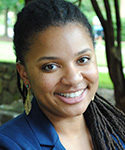September 5th, 2016
Men, Women, or Both?
April Edwards, MD

April Edwards, MD, is the 2016-17 Chief Resident for Internal Medicine/Pediatrics program at the University of North Carolina School of Medicine.
Last month, as I was adjusting to my new role as a newly minted attending (affectionately referred to by many as a “pre-tending”), I had the opportunity to precept some of our strong upper levels in our ambulatory clinic. Luckily for me, they were doing a great job, which helped the whole thing feel less scary to me. During this clinic, one of the residents came into the workroom to exclaim excitedly —”I just asked someone if they have sex with men, women, or both — and they said both!” This reaction was not because this resident is bigoted nor that he wasn’t incredibly professional with great bedside manner. It was exactly the opposite — he diligently screened all of his patients for all of the “checky-boxes” we learned about in medical school, and he was just excited about the opportunity to care for a relatively underrepresented patient. But it made me pause for a moment and reflect on something that has become a hot topic for me locally.
I am from North Carolina. And earlier this year, my state passed a House Bill (HB2) that bans transgendered people from using the public restroom that aligns with their gender identity. The original Bill also nullified local ordinances that protected discrimination based on sexual orientation. The outcry from much of the public sector has been very loud and very visible, with people adopting anti-HB2 slogans like #WeAreNotThis and #Ya’llMeansAll. Thus, sexual identity has become a topic of conversation here in North Carolina, and also nationally, as companies, artists, investors, and developers pull out of North Carolina, so as not to support HB2. Most recently, the NBA AllStar game announced that it would not be holding its event in Charlotte.
This means that we, as physicians, have been talking about this issue as well, many of us more so recently. Institutions in our state are now having Grand Rounds on Transgendered Identity and Development, and the new Center for Child and Adolescent Gender Care just opened locally. In an attempt by many to not “miss” the LGBTQI community in a time when many feel neglected or discriminated against, some of us well-meaning physicians are at risk for getting a bit sidetracked by gender identity. By that, I mean I think it is easy to excitedly focus on a patient’s sexual identity in an attempt to show that you are supportive, in a time when this group is being marginalized. To congratulate yourself for being hip and open. But in doing so, it sets us up to miss an opportunity to support this community with some of the well studied means that we already have.
Recently, in NEJM Journal Watch, a physician-author reviewed an article addressing the health and health risk factors of the LGBQ community. Of the more than 65,000 people surveyed, those who identified as gay/bi/lesbian had higher rates of psychological stress and higher self-reported rates of substance use and abuse.
Because sexual orientation has been stigmatized for so long, I think it is incredibly easy for physicians, regardless of their personal or political views, to become fixated on this aspect of the patient. This often happens with only good intentions — physicians trying to be open and supportive and talk openly about issues of sexual orientation. Unfortunately, this hyper-focus often can happen to the detriment of other important health issues. I have been guilty of this, as I am willing to posit, have many of my peers.
What this aforementioned study suggests to us is that one of the best things we can do is spend a little extra time with this (LGBTQI) subset of our patients to actually discuss substance use and support systems in more depth than just checking off boxes on an intake questionnaire form. We know how to do this, and when we take the time, we can do it well. We have long had data articulating the many benefits of tobacco cessation, and the myriad other adverse health events tied to it. We should ask (and actually listen!) about other substance use, and counsel appropriately. And we ought to recognize the unique stressors weighing on these patients and spend more time exploring support systems and making sure they are adequately addressed and recognized.
Asking if someone’s sexual partners are male, female, or both can be a useful question and tool. But rather than us having it be the “checky-box” that defines them, let us instead let it be the start of well-tailored care centered in listening well.


HB2 doesn’t stop transgendered people from using whatever bathroom they identify with it would simply require them to use the bathroom correlated to what is listed on their birth certificate which can be easily changed in North Carolina from what is assigned at birth.
Chae Thomas… Are you transgendered? Do you even know anyone TG? Of course not, or you would know that such ‘requirements’ are ridiculous. Define ‘easily changed’. Have you been through transition? Again… know ANYONE who has? Of course not, or you would immediately understand how crazy HB2 is and why we will fight it as hard as we can. Fortunately we are not alone thanks to the fact that HB2 only targeted Trans people as scapegoats, most of this ‘hate bill 2’ targets low income minorities, so the NAACP and ACLU are on the team against this continuing right-wing conservative hatred. I’ve been Trans for 40 years… I probably was using the stall next to your wife, girlfriend, mother or grandmother and no one, not your sex organ police, nobody… knew I was Trans, and yet now you must attack me and my sisters? Hmm, election coming up… oh yeah… makes sense now. Get ready for some changes.
Changing one’s birth certificate in North Carolina is not that easy. First of all, one must get a letter from a doctor that one has had sex reassignment surgery. North Carolina is not one of the states that requires insurance to cover the surgery (though the Obama administration is trying to eliminate transgender insurance exclusions nationwide), so one might not be able to afford the surgery. Second, one may have been born in a state or country that does not allow changing birth certificates. Third, after getting proof from a doctor of having had surgery, one must petition the court and get a judge to agree to the change.